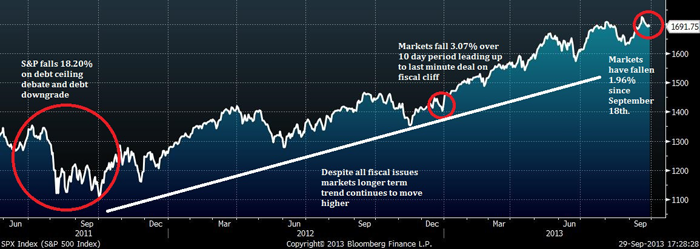Washington is back in the spotlight as politicians continue their normal routine of being ineffective. This week, markets have to deal with the political mess of politicians trying to avoid a government shutdown. We still have to wait to encounter the next debate in October which will surround the debt ceiling.
Markets have dealt with this before and it tends to be short term volatility that has actually provided for good buying opportunities for investors. We had the debt ceiling debate, coupled with a downgrade to our debt, in the summer of 2011. This led to the largest correction we have seen during the markets 4+ year bull run.
After the summer of 2011, we endured many other fiscal messes along with a national election in 2012. The election was followed by the fiscal cliff debate. In many of these situations, we have seen markets fall (sometimes greater than others) putting pressure on politicians to make decisions. We will likely see that again during these debates. We have actually already seen it begin to play out with the markets’ reaction last week.
We saw markets fall a little more than 18% (from peak to trough) during the debt ceiling debates and credit downgrade in the summer of 2011. Markets were resilient for much of the fiscal cliff debate, until the deadline approached which caused markets to fall a little over 3% before the last minute deal.
And since the Fed’s announcement not to taper spurred a rally in markets, we have since seen markets fall nearly 2% as we head into Monday night’s deadline for a solution or a possible government shutdown.

What this all means is that over the next couple of weeks, we are likely going to continue to see market volatility. But what has been proven over the past fiscal debates is that the market has prevailed longer term, thus these times of volatility created by our incompetent politicians could provide opportunity for investors willing to invest for the longer term. This particular time could provide opportunity to enter a market that looks poised to finish the year on a high note.
(All data used within The Capital Course was provided by Ned Davis Research)











